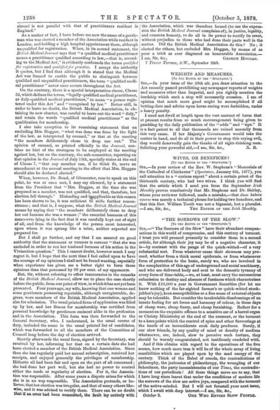"THE SORROWS OF THE SLOW."
[TO THE EDITOR OF THE"SPECTATOR."] SIR,—" The Sorrows of the Slow" have their abundant compen- sations in this world of compromise, and this century of torment I trust you will proceed presently to consider them in a second article, for although their joy may be of a negative character, it is—by contrast with the pangs of the quick-witted—of a very substantial sort. From whatever cause their slowness may pro- ceed, whether from a thick moral epidermis, or from whatsoever form of protection to the brain, surely we, who are involved in the complexities of this age of underground and social machinery, and who are delivered body and soul to the domestic tyranny of every form of time-table,—we, at least, must envy the unconsciotte submission to destiny and absence of fussiness which characterises it. With £10,000 a year in Government Securities (for let me- know nothing of the far-sighted farmer's or quick-witted stock- jobber's joy), keen susceptibilities or a fine sense of external objects may be tolerable. But consider the incalculable disadvantage of an innate feeling for art forms and harmony of colour, in these days- of cheap ware, cheap finery, and cheap furnishing. Reflect for a moment on the exquisite offence to a sensitive ear of a barrel organ or Christy Ministrelsy at the end of the crescent, or the torment to a keen palate which the control of spice and other flavourings at the hands of an inconsiderate cook daily produces. Surely, if our slow friends, by any quality of mind or density of medium whatsoever, are, indeed, slow to perceive such torture, they should be warmly congratulated, not insidiously condoled with.
And if this obtains with regard to the operations of the five senses, how much more true it will be of the whole array of living sensibilities which are played upon by the mad energy of the century. Think of the Babel of creeds, the contradictions of philosophy, the jealousies of philanthropy, the wrangling of our Schoolmen, the party inconsistencies of our Times, the contradic- tions of our periodicals ! All these things move me to say, that I have long since learnt that under the conditions of modern life the sorrows of the slow are active joys, compared with the torment of the active-minded. But I will not forestall your next issue, which I await with deep interest.—I am, Sir, &c., October 8. ONE Wao ENVIES SLOW PEOPLE.


































 Previous page
Previous page